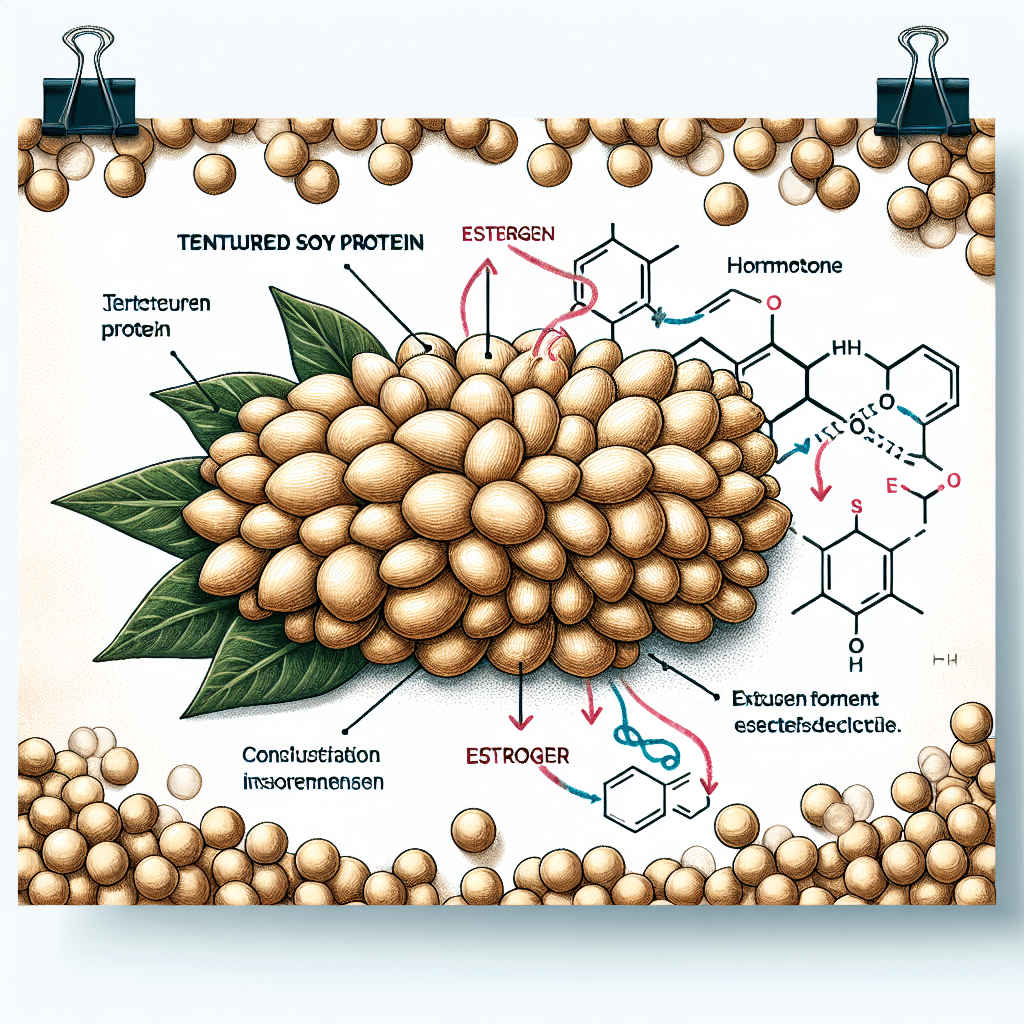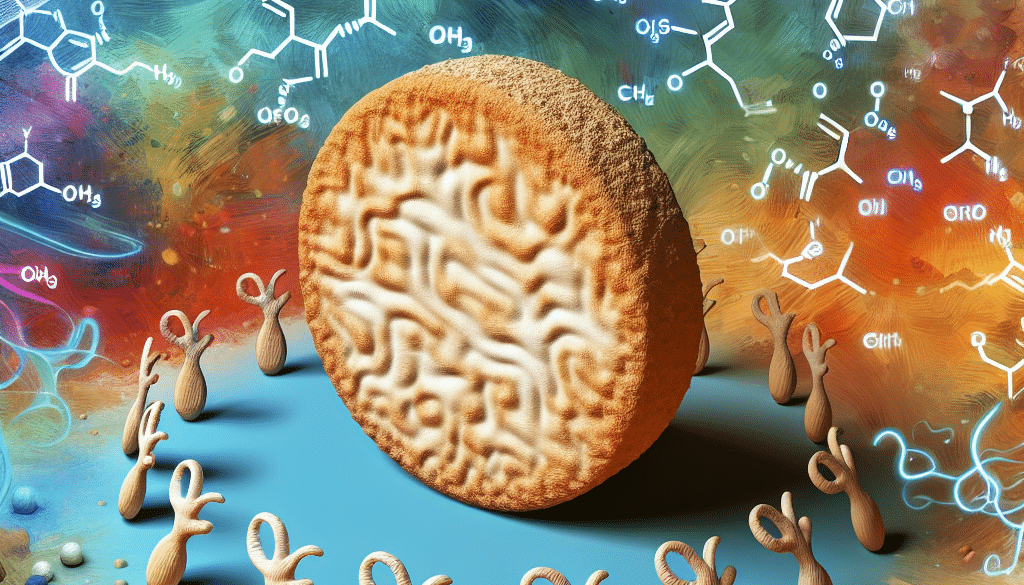Does Textured Soy Protein Have Estrogen?
-
Table of Contents
- Textured Soy Protein and Estrogen: Understanding the Connection
- What is Textured Soy Protein?
- Phytoestrogens in Soy: A Brief Overview
- Does Textured Soy Protein Contain Estrogen?
- Health Implications of Phytoestrogens in Textured Soy Protein
- Textured Soy Protein in the Diet: Considerations and Recommendations
- Case Studies and Statistics: Real-World Evidence
- Conclusion: Understanding the Role of Textured Soy Protein
- Discover ETprotein’s High-Quality Protein Products
Textured Soy Protein and Estrogen: Understanding the Connection

Textured soy protein (TSP), also known as textured vegetable protein (TVP), is a highly versatile food ingredient derived from soybeans. It is commonly used as a meat substitute or extender in a variety of dishes, from vegetarian burgers to chili and stews. Given its origin from soy, a plant known for its phytoestrogen content, questions often arise regarding the presence of estrogen in textured soy protein and its potential effects on human health. This article delves into the scientific evidence to explore whether TSP contains estrogen and what implications this may have for consumers.
What is Textured Soy Protein?
Before we examine the relationship between TSP and estrogen, it’s important to understand what textured soy protein is and how it’s made. TSP is produced from defatted soy flour, a byproduct of soybean oil extraction. The flour is processed under high temperatures and pressures to change its structure, resulting in a fibrous, spongy matrix that closely resembles the texture of meat. This process also deactivates certain anti-nutritional factors present in raw soybeans, making TSP a nutritious and safe food ingredient.
Phytoestrogens in Soy: A Brief Overview
Soybeans contain naturally occurring compounds known as phytoestrogens, which are plant-derived nonsteroidal compounds that have the ability to exert estrogen-like effects in the body. The most notable phytoestrogens in soy are isoflavones, which include genistein, daidzein, and glycitein. These compounds can bind to estrogen receptors in the body, potentially influencing estrogen-related processes.
Does Textured Soy Protein Contain Estrogen?
It’s a common misconception that soy products like TSP contain estrogen. In reality, soy contains phytoestrogens, not the same estrogen that animals produce. While phytoestrogens can mimic some of the actions of estrogen due to their structural similarity, they are not identical to human estrogen and do not have the same potency.
- Phytoestrogens are significantly weaker than human estrogen.
- The effects of phytoestrogens can vary depending on the individual’s existing hormone levels and overall health.
- Phytoestrogens can have both estrogenic and anti-estrogenic effects, depending on the context.
Health Implications of Phytoestrogens in Textured Soy Protein
The presence of phytoestrogens in TSP has led to a wealth of research on their potential health implications. Here are some key findings:
- Menopausal Symptoms: Some studies suggest that soy isoflavones may help alleviate hot flashes and other menopausal symptoms due to their mild estrogenic effects.
- Heart Health: Research indicates that soy protein, including TSP, may have a beneficial effect on heart health by improving cholesterol levels.
- Bone Health: There is evidence to suggest that soy isoflavones may help maintain bone density and reduce the risk of osteoporosis in postmenopausal women.
- Cancer Risk: The relationship between soy consumption and cancer risk, particularly breast and prostate cancer, is complex and not fully understood. Some studies suggest a protective effect, while others indicate no significant impact.
It’s important to note that the effects of phytoestrogens can vary widely among individuals, and more research is needed to fully understand their health implications.
Textured Soy Protein in the Diet: Considerations and Recommendations
For those considering incorporating TSP into their diet, there are several factors to keep in mind:
- Variability in Isoflavone Content: The isoflavone content of TSP can vary depending on the processing methods used. Consumers should be aware of this variability when evaluating the potential effects of TSP on their health.
- Dietary Balance: As with any food, moderation is key. TSP can be a healthy part of a balanced diet when consumed in appropriate amounts.
- Individual Health Conditions: Individuals with specific health concerns or hormonal sensitivities should consult with a healthcare provider before making significant changes to their soy intake.
Case Studies and Statistics: Real-World Evidence
Several case studies and epidemiological research provide insights into the real-world consumption of soy products like TSP:
- In Asian populations, where soy consumption is traditionally high, there is generally a lower incidence of certain hormone-related cancers, suggesting a potential protective effect of dietary soy.
- Some clinical trials have shown that soy supplementation can lead to modest improvements in menopausal symptoms compared to placebo.
- Statistical analysis of large cohorts has found an association between soy consumption and improved heart health markers, such as lower LDL cholesterol levels.
These examples underscore the importance of considering the broader context of dietary patterns and lifestyle factors when evaluating the health effects of soy products.
Conclusion: Understanding the Role of Textured Soy Protein
In conclusion, textured soy protein does not contain estrogen but rather phytoestrogens, which are plant-based compounds with estrogen-like activity. The health implications of consuming TSP are complex and can vary depending on individual factors and dietary context. While some research suggests potential health benefits, it’s essential to consume TSP as part of a balanced diet and consult with healthcare professionals as needed.
Discover ETprotein’s High-Quality Protein Products
If you’re looking for high-quality protein products, consider ETprotein’s offerings. Their range of organic bulk vegan proteins, including textured soy protein, is characterized by a neutral taste, non-GMO, and allergen-free attributes. With L-(+)-Ergothioneine purity over 98%, ETprotein caters to a diverse range of industries, ensuring comprehensive solutions to meet all your protein needs.
About ETprotein:
ETprotein, a reputable protein and L-(+)-Ergothioneine (EGT) Chinese factory manufacturer and supplier, is renowned for producing, stocking, exporting, and delivering the highest quality organic bulk vegan proteins and L-(+)-Ergothioneine. They include Organic rice protein, clear rice protein, pea protein, clear pea protein, watermelon seed protein, pumpkin seed protein, sunflower seed protein, mung bean protein, peanut protein, and L-(+)-Ergothioneine EGT Pharmaceutical grade, L-(+)-Ergothioneine EGT food grade, L-(+)-Ergothioneine EGT cosmetic grade, L-(+)-Ergothioneine EGT reference grade and L-(+)-Ergothioneine EGT standard. Their offerings, characterized by a neutral taste, non-GMO, allergen-free attributes, with L-(+)-Ergothioneine purity over 98%, 99%, cater to a diverse range of industries. They serve nutraceutical, pharmaceutical, cosmeceutical, veterinary, as well as food and beverage finished product distributors, traders, and manufacturers across Europe, USA, Canada, Australia, Thailand, Japan, Korea, Brazil, and Chile, among others.
ETprotein specialization includes exporting and delivering tailor-made protein powder and finished nutritional supplements. Their extensive product range covers sectors like Food and Beverage, Sports Nutrition, Weight Management, Dietary Supplements, Health and Wellness Products, and Infant Formula, ensuring comprehensive solutions to meet all your protein needs.
As a trusted company by leading global food and beverage brands and Fortune 500 companies, ETprotein reinforces China’s reputation in the global arena. For more information or to sample their products, please contact them and email sales(at)ETprotein.com today.












